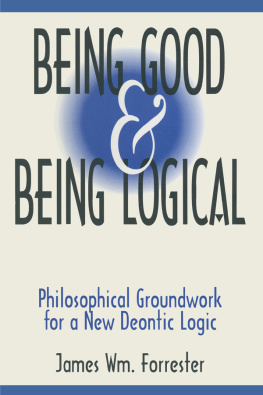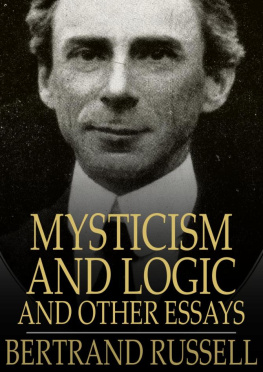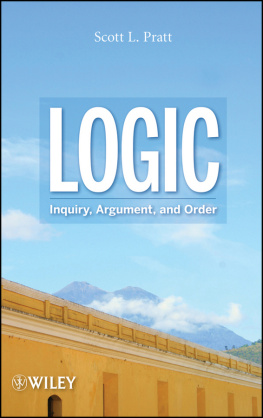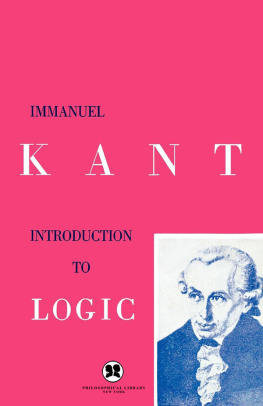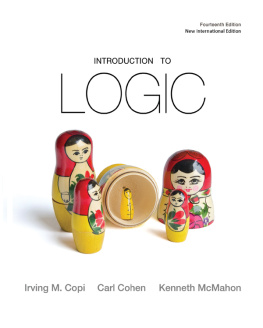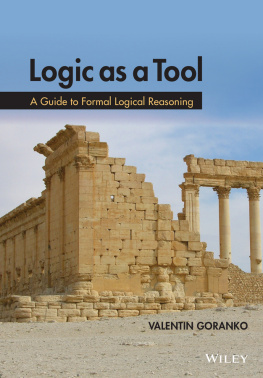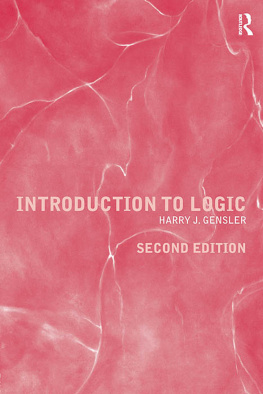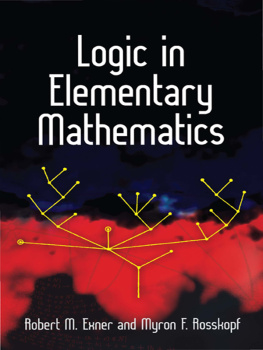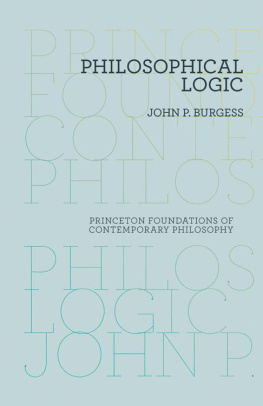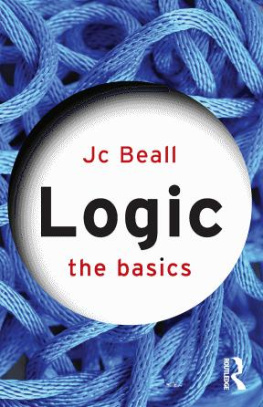BEING GOOD & BEING LOGICAL
BEING GOOD & BEING LOGICAL
Philosophical Groundwork for a New Deontic Logic
James Wm. Forrester
First published 1996 by M.E. Sharpe
Published 2015 by Routledge
2 Park Square, Milton Park, Abingdon, Oxon OX14 4RN
711 Third Avenue, New York, NY 10017, USA
Routledge is an imprint of the Taylor & Francis Group, an informa business
Copyright 1996 by James W. Forrester. All rights reserved.
No part of this book may be reprinted or reproduced or utilised in any form or by any electronic, mechanical, or other means, now known or hereafter invented, including photocopying and recording, or in any information storage or retrieval system, without permission in writing from the publishers.
Notices
No responsibility is assumed by the publisher for any injury and/or damage to persons or property as a matter of products liability, negligence or otherwise, or from any use of operation of any methods, products, instructions or ideas contained in the material herein.
Practitioners and researchers must always rely on their own experience and knowledge in evaluating and using any information, methods, compounds, or experiments described herein. In using such information or methods they should be mindful of their own safety and the safety of others, including parties for whom they have a professional responsibility.
Product or corporate names may be trademarks or registered trademarks, and are used only for identification and explanation without intent to infringe.
Library of Congress Cataloging-in-Publication Data
Forrester, James W.
Being good and being logical : philosophical groundwork for a new deontic logic /
James W. Forrester.
p. cm.
Includes bibliographical references and index.
ISBN 1-56324-879-4 (hardover : alk. paper).ISBN 1-56324-880-8 (pbk.: alk. paper)
1. Deontic logic.
2. Ethics.
I. Title.
BC145.F65 1996
160dc20
96-15791
CIP
ISBN 13: 9781563248801 (pbk)
ISBN 13: 9781563248795 (hbk)
To Mary Gore Forrester
Without whose suggestions, criticisms, and encouragement
this book would never have been written
(including the parts she disagrees with!)
This book is dedicated
with respect and with love.
Certainly, then, ordinary language is not the last
word: in principle it can everywhere be supplemented
and improved upon and superseded. Only remember, it
is the first word.
J.L. Austin
A Plea for Excuses
Contents
In a preface, it is customary to thank all those people who have helped in the writing of the book. I owe four major debts for this book; unfortunately, one of them I can never hope to repay in person.
While working on the first draft of this book, I learned of the death of Hector-Neri Castaeda. It was Hector who stimulated my interest in deontic logic and who strongly encouraged my work in the field. His unselfishness, his dedication, his immense critical abilities, and his constant desire to build rather than to destroy are familiar to all of us who knew him. For me, he was in all ways an example of what a philosopher should be.
I am also greatly indebted to an anonymous reviewer, who not only pointed out a number of faults in an earlier version of the work but also made some extremely helpful suggestions for clarifying my presentation. are the direct result of the reviewers suggestions.
Professor Stephen Harris, who was a referee for the book, made suggestions that have led to major improvements in both clarity and content. was written at his urging.
My last major debt is to the books dedicatee: my wife, Mary Gore Forrester. She has worked on deontic logic far longer than I have. We have talked for years about many of the points covered in this book; in fact, began as a jointly written paper. The whole focus of the book changed because she made me see that a deontic logic using causal conditionals is the only sort that can hope to be true to our actual moral arguments. To have ones best and most constructive critic quite literally in-house is rare good fortune.
Many others have contributed to this book. Audiences at the University of Wyoming and at Colorado State University, to whom I read sections of the book in progress, proved both helpful and kind in their comments. Matthias Steup, a former colleague of mine, provided valuable input into what became to the Mountain-Plains Philosophy Conference, where I received valuable comments from Luc Bovens. And I am grateful for valuable practical advice to G. Nick Street.
For any mistakes, solecisms, and downright barbarisms that might remain, I am, of course, responsible. The others tried their best!
The theologian Tertullian, denouncing those who would mix a little Greek philosophy with their Christianity, once thundered, What has Athens to do with Jerusalem? Similarly, I suspect, most people today would find highly unlikely the notion that ethics has anything much to do with logic. Ethics, whether one takes it as a matter of getting in touch with ones own feelings, with ones conscience, or with ones God, would seem almost a polar opposite from logic, that cold specialty of mathematicians. I would not be surprised to hear of someone who labels ethics a right-brain, logic a left-brain phenomenon.
But there is a long history of philosophers who have assigned logic a special place in ethics. And the twentieth century has seen the birth and rapid growth of deontic logic, a special branch of logic concerned with obligation and permission. Deontic logic has its own axioms and rules of inference; moral beliefs that run afoul of these are considered on a par with addition that runs afoul of the rules of arithmetic. The Athens of logic and the Jerusalem of ethics seem to be merging into a single deontic metropolis.
And yet, not all is well with deontic logic. There is a standard version of it Standard Deontic Logic (SDL), put forward by deontic logics founding father, G.H. von Wright but sometimes it seems as though the standard is only a target for deontic logicians to snipe at. Alternative formulations are common, and there seems no way of telling which, if any, is correct. A related difficulty arises from what seems an ever-increasing set of deontic paradoxes. The special rules and axioms of deontic logic, supposedly neutral among ethical theories, seem to entail some unusual perhaps in a few cases even unethical results. For these reasons, even if in fact we do have reason to think the Jerusalem of ethics merely a suburb of the Athens of logic, our surveyors are having difficulty discovering just where that suburb is located.
Surely the cities are connected. At the least, ethics is a field of study; like other fields of study, it has a structure. Because of the structure of ethics, we can and do make logical inferences concerning ethical statements. But such a logic is a minimal one, consisting solely of the propositional calculus and special definitions. Ethics, I shall argue, needs more logic than those bare bones can provide.
I believe that there is also a special logic of obligation and permission. The rules of this special logic go beyond the propositional calculus, although they are less far-reaching than most deontic logicians have claimed. My main purpose in this book is to set out and justify that new deontic logic.

